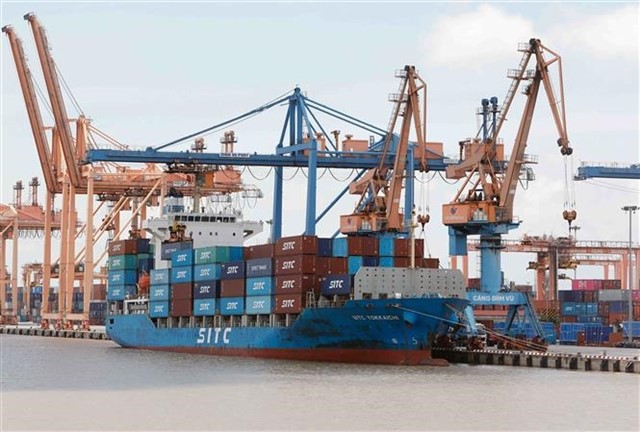Vietnamese businesses need to step up the building of close relationships with partners and associations in the US.

Businesses around the world are anxiously awaiting the results of the US presidential election this week because whether Republican Donald Trump or Democratic Kamala Harris wins, the government under the new president will continue to pursue international trade policies that protect US businesses.
Việt Nam's exports to the US grew at an average rate of 15.3 per cent per year from 2018 to 2023.
The US continues to be Việt Nam's largest export market in the first nine months of this year, with a turnover of more than US$89 billion, raising the country's trade surplus to the US to about $78.5 billion, a year-on-year growth of 31 per cent. This shows the US market's great potential for Việt Nam.
The latest reports on the consumer market show that Americans continue to spend more than expected on various types of goods.
According to estimates from the National Retail Federation (NRF), total spending in the US during the year-end holiday season in the last two months of this year will reach about $980-989 billion, an increase of 2.5-3.5 per cent over the same period last year.
Although the US consumer market has many optimistic signs, businesses exporting goods to the US are hesitant.
During the election campaign, both the Republican and Democratic presidential candidates announced their intentions to rise import taxes, although the tax increase policies are different between the two candidates.
Trump was more aggressive when he initially proposed a 10 per cent tax on all imported goods from any country, recently raising it to 20 per cent.
Meanwhile, Harris believes that Trump's general 10 per cent tax on all imported goods is a direct tax that costs Americans more in spending.
She proposes using tax credits to subsidise domestic businesses to develop industries such as clean energy, semiconductors, solar panels and electric vehicles, which is like an indirect tax.
The difference between Trump and Harris is only in degree and scale. Trump uses taxes as a wall to protect domestic production, while Harris is also building a fence, although it is thinner, but it also has the task of protecting American businesses.
Overall, the views of the Democratic and Republican parties on trade policy with China have become quite similar.
Therefore, these policies are unlikely to change regardless of the outcome of the US presidential election this month.
It is worth noting that President Joe Biden is still maintaining Trump's tariff policy on China despite his strong criticism of the imposition of tariffs during the 2020 election campaign.
What Vietnamese businesses should do?
From another perspective, the Thời báo Kinh tế Sài gòn (Sài Gòn Economic Times) quoted expert Michael Kokalari, a chartered financial analyst and chief economist at VinaCapital, said that if elected, Trump was expected to focus on reducing the value of the dollar instead of raising taxes.
Raising taxes would increase inflation in the US while a weaker dollar would also help the US government solve many other problems, including the country's huge debt.
A weaker dollar would boost Việt Nam's exports to countries outside the US, and imposing a 10-20 per cent tariff on imports from countries other than China would not reduce Việt Nam's competitiveness, he said.
In addition, if the US imposes a 60 per cent tariff on China, Việt Nam and Mexico will once again benefit the most in terms of exports, according to a report by Standard Chartered and others.
In a report released by Vinacapital in early September this year, Michael Kokalari commented that Việt Nam was one of the three countries in the world with the closest economic ties to the US, after Canada and Mexico.
Strong US consumption is driving the recovery of Việt Nam's exports, manufacturing and GDP growth.
US consumption is still recovering very well this year despite the Fed's record interest rate hikes.
Strong demand for “Made-in-Việt Nam” products from US consumers has driven a recovery in Việt Nam’s exports to the US from a 21 per cent year-on-year decline in the first seven months last year to a 24 per cent growth in the first seven months of this year.
In the medium term after the US election, Michael Kokalari said that US consumer demand for “Made-in-Việt Nam” products might slow down but not fall sharply in early next year.
Politicians on both sides of the US political spectrum want to bring manufacturing back to the US, which failed after China joined the World Trade Organisation (WTO).
However, due to the high cost of manufacturing products in the US and the low number of skilled manufacturing workers in the country, reshoring was unlikely to pose a serious threat to products made in Việt Nam, he noted.
Most economists all share the view that Trump’s proposed tariffs on imports into the US will create more negative effects than positive ones.
Tariffs will lead to trade confrontations, including trade wars, which will harm all countries, restrict global trade flows, disrupt supply chains, slow down overall economic growth and certainly create inflationary pressures.
Faced with changes that may arise from the US election, Vietnamese businesses need to be well prepared and proactively develop strategies to respond to new economic scenarios.
The VnBusiness online magazine quoted economic expert Nguyễn Hoàng Long as saying that Vietnamese businesses needed to step up the building of close relationships with partners and associations in the US.
He believed that this would help businesses not only receive policy support from US localities but also build long-term, sustainable relationships with important strategic partners.
This became even more important when both presidential candidates tend to prioritise domestic economic interests, which posed challenges for Vietnamese export enterprises.
One of the important factors that helps Việt Nam maintain and develop economic relations with the US is the protection provided by the global multilateral trading system, especially the World Trade Organisation (WTO).
In the context of trade tensions between the US and China that might continue to escalate, it was very important to ensure that US policies did not negatively affect third countries like Việt Nam, he added. — VNS
- Tags
- Việt Nam's exports





